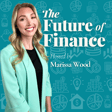
Financial Cruise Control by 40: How This Couple Mastered Wealth, Risk & Retirement Planning 🚗💰
In this inspiring episode of The Future of Finance Podcast, host Marissa Wood sits down with power couple Sarah and Eric Taylor to explore how they achieved financial "cruise control" before turning 40.
💆 Sarah, a licensed massage therapist and founder of Stay Well Massage, shares her journey of launching a successful business from scratch. 🧠 Eric, a risk management expert, offers his strategic take on investments, wealth-building, and early retirement planning.
- Together, they talk about:
- Building wealth as a couple 💼
- Investing with intention 📈
- The power of cash value life insurance 🛡️
- Knowing your numbers 📊
- Their best (and worst!) financial decisions 🤦♀️🤓
Whether you're an aspiring entrepreneur, a young investor, or looking to simplify your finances, this episode is packed with wisdom, relatable stories, and actionable insights.
🔗 Book with Sarah at: https://staywellmassage.net
📅 Connect with Marissa: https://www.union-financial.com/
⏱️ Timestamps
00:00 – Intro to Sarah & Eric Taylor
01:12 – How Marissa and Sarah met: a fender bender and fate
04:04 – Sarah’s path to starting Stay Well Massage
07:16 – Must-know tips for launching your own business
08:50 – Customizing the client experience in any business
09:58 – Eric’s investment philosophy: “No risk, no biscuit”
14:09 – Why 401(k) rollovers matter—even if you're happy with yours
19:08 – Consolidating your retirement accounts
20:31 – Understanding Indexed Universal Life Insurance (IULs)
24:53 – Retirement analysis: Are you on cruise control or need a pit stop?
26:38 – The value of knowing your numbers
30:18 – Risk management and early retirement planning
33:41 – How to prepare for both “dying too soon” and “living too long”
41:13 – Worst financial decisions: a condo, a Mercedes & a case of beer
44:25 – Best decisions: hiding money from yourself + buying at the right time
48:07 – Final thoughts & where to find Sarah’s services
📌 Hashtags
#FinancialFreedom #EntrepreneurJourney #FutureOfFinance #MoneyMatters #MassageTherapist #EarlyRetirement #IUL #401kRollover #FinancialPlanning #StayWellMassage #InvestSmart #RiskManagement #KnowYourNumbers
